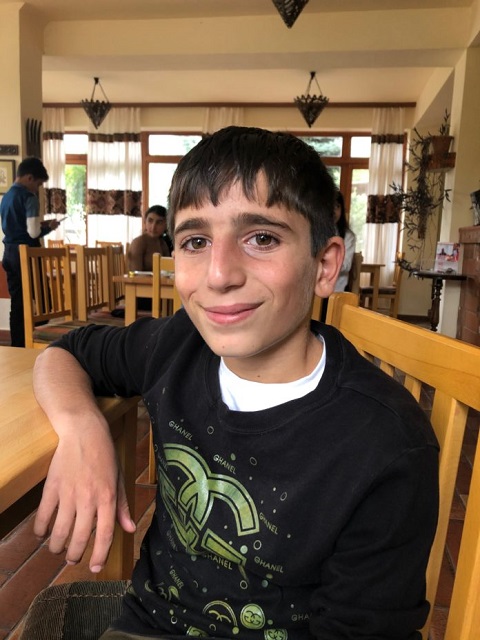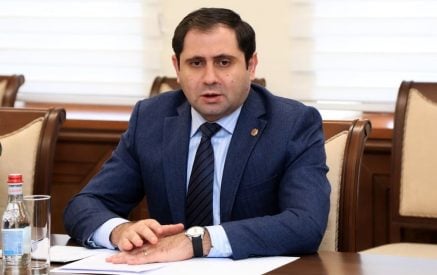In addition to those that took refuge in Armenian cities on the Artsakh border such as Goris and Vardenis, many have also made their way to Yerevan. These beleaguered families have been readily hosted by the city’s hotels, by relatives, by charitable organizations, and even by strangers. One of these families is that of Gayane S. As a Stepanakert resident, Gayane was in the thick of the heavy enemy shelling and UAV attacks on the first days of the war and was forced to flee.
In the wake of a surprise attack in which the Azeris launched swarms of drones against Artsakh, the women and children of this family found themselves in Yerevan. They were forced to leave behind their male relatives who went straight to the front. Happily, this beleaguered family has found shelter in the home of a very generous friend in Yerevan, and Gayane has been residing in a compound in Armenia’s capital city ever since.
Read also
Gayane, 37, vividly remembers the day her life changed forever: “Early in the morning, we heard thunder from the clear skies, and we understood that these are the sounds of war. My husband immediately spotted an Azeri UAV being shot down.”
Gayane was quick to wake her children and lead them to the bunker in their home’s garden. The bunker had been constructed during the fighting of the 1990s, and Gayane’s family had opted to keep it intact when they bought their residence in downtown Stepanakert: “Our neighbors were quite happy with that decision. They came to the bunker when the bombardment started.” Gayane, along with her daughter, Anna, and her neighbors prayed as the boom of guns continued.
However, the bunker was small and damp, its walls made of sand. Soon, Gayane’s children complained of nausea, and they could not stay in the bunker. As the air raid sirens continued to blare, the bunker shook as Artsakh’s howitzers fired in retaliation. When Gayane’s husband told her to prepare to leave the city with her children, she never imagined she would be gone long. “I was sure we would come back soon. We had tracked dirt into the house from the bunker, and I was sure we would be back soon to clean it all up,” she added. But as the weeks came and went, the prospect for the Gayane’s quick return to their home became grim.
Gayane lost her brother to a drone attack in the war’s early days, and was able to briefly return to Stepanakert to pay her last respects: “All the time I was back, the sirens blared, and they continued to hit the city constantly. When I went, the whole community came to mourn my brother’s death.” But as the security situation has become increasingly precarious, conventional funerals have become impossible. “Now, people don’t have time to even keep the body. It must be buried quickly, and less that a handful of people can attend the service. When my neighbor died, his wife and children couldn’t go to Artsakh to mourn him, because it wasn’t safe,” she said.
Tragically, such realities are becoming increasingly common.
Despite this, Gayane hoped for victory, and prayed that this will be the final war, so that the people of Artsakh would no longer have to live with fear and uncertainty. “I feel we will win, but I don’t know how we will go back and cope with all the loss and go on.”
Having endured heart wrenching loss over the course of this war, Gayane is painfully aware of the precariousness of life in a warzone. “In Artsakh, everything you do or want to do has to take the war into account. You must always weigh the pros and cons, as you can lose everything in an instant. You do not know what tomorrow will bring,” she said.
Arev’s Story
Arev A. is a 35-year-old housewife, who fled her house in Stepanakert along with her children, taking refuge in the home of a Yerevan resident who has generously opted to host them. Arev, like countless residents across Artsakh, awoke around 7 a.m. on a serene morning of clear blue skies to the sounds of battle: “We live in the highest part of Stepanakert, and from far we could feel our walls shaking as bombs detonated in the distance. At first, we thought the booming sounds were those of thunder, but when we saw the clear skies, we knew it couldn’t be.”
The specter of swarms of attacking drones still remained vivid in Arev’s recollections. “Every hour in the afternoon and night we saw one [drone] or we heard them and saw some get shot down. This, along with the deafening sound of Artsakh howitzers exacerbated the sense of fear in the city: “everywhere was panic,” Arev recalled.
Because her mother lived in the city center on the fifth floor of one of Stepanakert’s many apartment blocks, Arev’s husband went to get her mother and bring her to their home. Arev could not allow her children to go outside and play, and they soon became fearful and restless. “My youngest daughter said she didn’t want our house to blow up, and that she didn’t want her father to go to heaven,” she said. The fighting similarly took a toll on Arev’s eldest son, a boy of 7 who is very sensitive to noise. “He couldn’t take the sounds of bombardment and started to cry,” she added.
Arev initially had no intention of leaving the city. She, like so many others of her generation in Artsakh had to live through the fighting of the 1990s as a child. However, Artur, an Artsakh man who has devoted his time to help evacuate families from Stepanakert, compelled her to prepare to leave the city: “He warned that the Azeris planned to strike the city with powerful weaponry… I had 20 minutes to pack up and leave with my kids. My mom encouraged me to leave, and that was a decisive moment for me.”
The Value of Peace
Arev left the city along with her relative, Loucine A. and her family. A 39-year-old housewife, Loucine was similarly disoriented by the morning attack. “We never expected an attack on Stepanakert. For us, the war felt distant before,” she said.
Despite this, Loucine had grown used to the sounds of battle, having lived through adolescence during the ’92 war: “We were used to the bombings, so we weren’t afraid as children. You can say that I took those years lightly.”
But as a parent, Loucine found her experience to be markedly different: “Its terrible, because you fear for your children. I immediately understood I couldn’t stay in Stepanakert… when I saw the fear and trauma on the faces of my children.”
When full-scale war resumed on September 27, Loucine rushed into the bunkers with her children, quickly grabbing anything useful such as clothes, water, snacks, and medication for her 17-year-old daughter. Loucine found herself torn apart with worry, fearing for her son who was staying with his grandmother, and for her husband who was on the front as the fighting began.
Loucine was eventually able to reunite with her son at his grandmother’s house: “Since we were together, things became calmer, and we began to see the reality, that a war had started,” she said.
Loucine left the next day along with her children with the help of Artur.
The decision to leave left her conflicted, as it meant leaving her brother and husband — both in the army — behind: “It was really hard, because I had no time to think. I battled with my thoughts on the decision to leave the whole way to Yerevan,” she added.
For Loucine, the entire event underscored the stark realities of life in a warzone. Life in Artsakh is rife with difficulties brought on by conflict: “people are still trying to overcome the consequences of the first two wars, and finding employment to provide for your family, and good education for your kids is really hard.”
Nevertheless, Loucine believes that living in such a precarious situation allows her a unique and valuable perspective. “You understand how valuable peace is, and you understand the price that comes with that peace,” she said. She hopes that those living in the Armenian diaspora appreciate this reality, and support Artsakh in any way they can, whether it be morally or materially.
“When you live here, it is like being on the frontline of the war between light and dark,” Loucine added.



























































